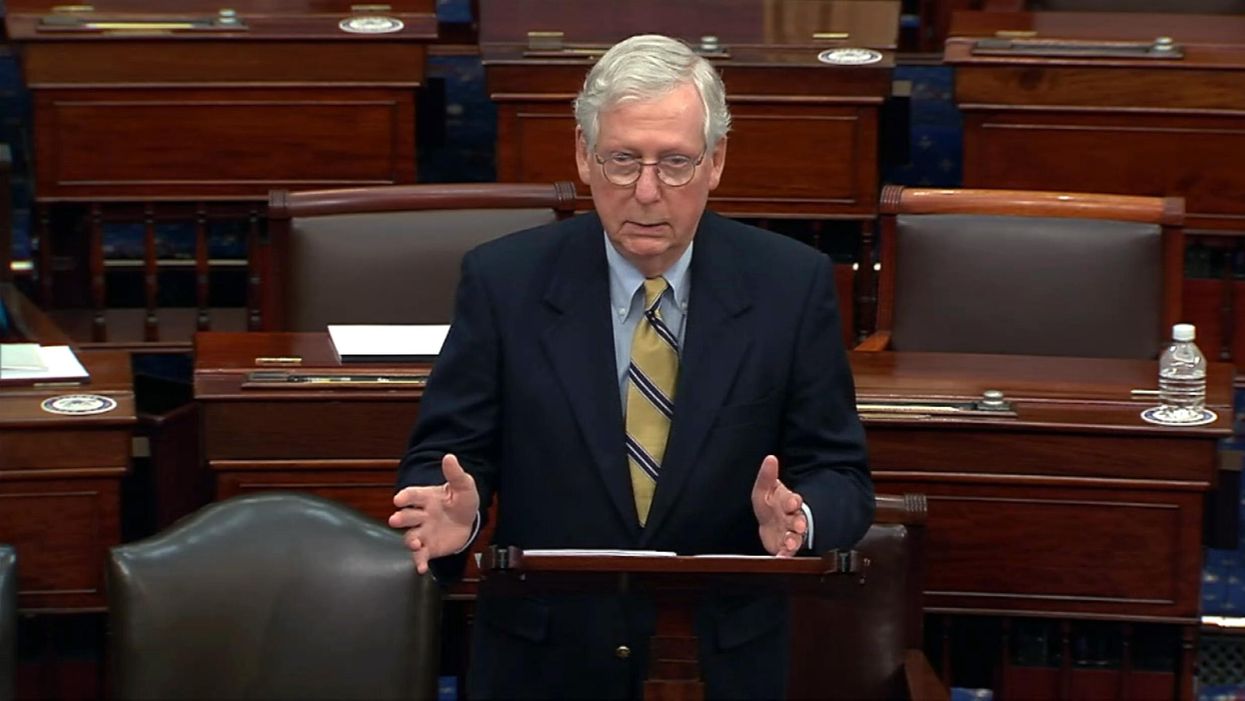Marcuss is a retired partner at the law firm Bryan Cave and on the steering committee of Lawyers Defending American Democracy.
Donald Trump tried to steal the election and prevent the peaceful transfer of power. And 43 Republican senators said that's OK when they voted to acquit him in the impeachment trial. It was time to "stop the steal," as the former president's allies so often shout. But it was the Senate that refused.
Trump's militias attacked the Capitol, tried to stop Congress from counting the electoral votes that confirmed his defeat, called for hanging the vice president and threatened to assassinate the speaker of the House. And 43 Republican senators said that's OK.
The melee created by Trump's militias led to the deaths of at least five people, including a Capitol Police officer, and more than 100 of his colleagues were injured. Now the Capitol is an armed camp, surrounded by barbed wire and thousands from the National Guard. And 43 Republican senators said that's OK.
Americans might be forgiven for thinking the impeachment process is what protects the country from leaders like Trump, bent on destroying American democracy and the rule of law. Saturday's acquittal vote has proved this view to be dangerously wrong.
The Constitution provides that a president who commits "high crimes and misdemeanors" may be removed and disqualified from holding elective office. A president who incites a mob to seek to prevent Congress from certifying the results of an election he lost has unquestionably committed a high crime and misdemeanor.
Senators take an oath to "do impartial justice" before sitting in an impeachment trial. It was clear from the outset, however, that most GOP senators decided to ignore evidence of Trump's guilt even before the trial began. It's fiction that there was ever a chance for a real trial and the impartial administration of justice.
The undisputed evidence presented to the Senate demonstrated beyond a doubt that Trump started his effort to invalidate the 2020 election long before the first votes were cast, spreading the fiction that the only way he could lose was if the vote was rigged. After he actually lost, he kept spreading the lie that he'd been denied a second term by election thieves. Sixty or so courts across the land, including the Supreme Court, roundly disagreed.
In rally after rally, Trump nonetheless encouraged followers to believe his lies and urged them to come to Washington on Jan 6. Trump promised the day would be "wild."
And then, just before the start of the Electoral College tabulation ceremony, Trump repeated his Big Lie once more. He told a raucous rally that Joe Biden's victory "could not stand" and that Vice President Mike Pence had a duty to overturn the election. The mob then marched on the Capitol, ransacked the building, hunted for Pence and Speaker Nancy Pelosi and stopped the certification process for several hours. Trump, meanwhile, remained ensconced in the White House, did nothing to protect the Capitol, declared that his vice president had failed in his duty and embraced the mob.
"We love you; you're very special," he said as their insurrection continued, urging them once it was over to "Remember this day forever."
None of this was disputed. Even GOP Senate Leader Mitch McConnell said afterward that Trump was responsible for what happened and intended by his actions "to torch our institutions on the way out."
Yet, minutes earlier, McConnell and 42 other Republicans effectively did no more than shrug and say, "So what?"
McConnell shamelessly cloaked his vote with a laughable argument, that a former president was not constitutionally subject to an impeachment trial. But it was McConnell himself who prevented the trial from starting while Trump was still in office.
Nothing explains the acquittal, and McConnell's cynical contortions, except a craven surrender to political self-interest. A violent threat to our country be damned, said those who found Trump guiltless; for them, impartial justice meant nothing more than indifference to justice.
Impeachment is intended to protect the country from presidents who threaten the country's most sacred institutions, including the peaceful transfer of power. The process is meaningful, however, only if senators obey their oath to do "impartial justice." The Senate minority leader, and the other 42 Republicans who voted "not guilty," refused to do so despite knowing the charges were true.
The impeachment process can never be stripped entirely of political considerations. A politician not affected by politics, after all, is a dead politician. Senators are not like jurors in a regular court. They are not disqualified from voting because they know a lot about the case before the trial begins, or even if they have opinions about the merits of the case before seeing the evidence.
Like most things in life, however, conflicting pressures and obligations have to be balanced. There is an obvious conflict between the duty of impartiality, on the one hand, and the impossibility of expunging acquired biases and insulating politicians from political realities, on the other. Reconciling the two is not easy. What is inexcusable, however, is not even to try.
Those who voted not guilty did not try. They entered the Senate chamber determined to acquit and refused to be deterred. Some even openly collaborated with Trump's lawyers as the trial proceeded.
Those 43 senators have impeached the impeachment process. They have stolen from the Constitution a bulwark against tyranny and impeached themselves in the process.
But the other seven Republicans, and the 50 Democrats, knew the difference between commitment and capitulation on Saturday. They acquitted themselves by discharging their duty to act on the difference. Voters should remember this day forever.



















Trump & Hegseth gave Mark Kelly a huge 2028 gift